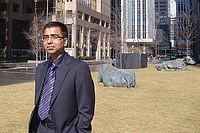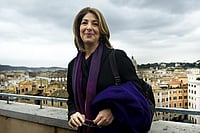There’s a somewhat obscure video on the website of the Ben Graham Centre for Value Investing, part of the University of Western Ontario’s Richard Ivey School of Business. This video dates back to May 25, 2007, a period American economists fondly reminisce about as pre-meltdown. It features Prem Watsa, founder, chairman and CEO of the Toronto-based investment firm Fairfax Financial Holdings Ltd—it’s his speech at the Ben Graham Centre’s first annual Intelligent Investing Conference. In the video, referring to charts, Watsa says, “We’re thinking of the possibility of a one-in-a-fifty-year, one-in-a-hundred-year storm coming.” The punchline is harder: “The music may stop again. We have to be careful. When it stops, it stops very quickly.”
That’s Watsa, who maintains a low profile despite a fortune estimated at anywhere between $2 billion and $4 billion. He has often been compared to Berkshire Hathaway’s Warren Buffett, the ‘Oracle of Omaha’. Watsa, predictably enough, is often described as the ‘Oracle of Ontario’, the province in which Toronto is located. And true to form, the reclusive Watsa did not speak to Outlook for this story. But other people who have interacted with him did so.
Watsa was introduced at that 2007 event by Prof George Athanassakos, director of the centre. Athanassakos recalls that speech: “Mr Watsa is an outstanding VI (value investor) with a contrarian view on things. His excellent reading of the markets in the last four years enabled him to successfully use credit default swaps (CDSS) and make money when everyone else lost. He had commented on the markets in a conference I ran in May 2007, in which he was the keynote speaker. During my visit to see Mr Buffett, he asked me who endowed my chair, and when I said Mr Watsa, he smiled and said, ‘Smart guy, he made a lot of money on cds.’”
Watsa was born in 1950 in Hyderabad to a Mangalorean Christian family. He attended Hyderabad Public School, before studying chemical engineering at IIT Madras. According to a profile in Toronto Life, which described him as “the richest, savviest guy you’ve never heard of”, Watsa chose to move to Canada to attend the Ivey School of Business because his brother lived in the town of London, Ontario, close to the university. His first job was at an insurance firm, Confederation Life, in 1974. As Watsa often mentions, he was among four candidates shortlisted. He goes on: “The reason I got the job was because three other guys didn’t show up.”

Photograph by Nilotpal Baruah
A decade after relocating from India, Watsa founded the asset management firm, Hamblin Watsa Investment Counsel, and a year later, assumed control of Markel Financial. He reorganised it as what is now the Canadian behemoth Fairfax. Watsa’s friend Mohnish Pabrai, managing director of the Irvine, California-based Pabrai Investment Funds, says there’s more to him than just investment acumen: “I would say Prem is a low ego, humble person. People tend to fixate on his investing skills. His skills as a business leader are vastly more important. Most of the core people he started with 26 years ago are still with him today, which is an unusual situation—and speaks volumes about Prem.”
In academia, Watsa retains considerable links with his alma mater, the Ivey Business School, sitting on the Ben Graham Centre’s advisory board. He is also chancellor of the University of Waterloo. Watsa sits on the board of philanthropic organisations and is deeply involved with his church and even manages its portfolio. The Watsas are also committed to providing $1 million every year for five years to the Dakshana Foundation, which was started by Pabrai for providing quality education to underprivileged children.
In a letter to Dakshana scholars, Watsa wrote of an experience that may just have altered the course of his life. At 21, travelling by train from Madras to Hyderabad, Watsa engaged in a casual conversation with a stranger, who asked him if he had read Napoleon Hill’s Think and Grow Rich. Watsa says in the letter that it was “the single best book that I have read and it changed my life forever”. Other milestone reads were Security Analysis and The Intelligent Investor, by legendary value investor Benjamin Graham. Watsa cites Graham’s influence in public, especially the mantra “Always look for a margin of safety”. Watsa and his wife Nalini named their son Ben (the couple also has two daughters).
That perhaps explains, partly, why Watsa is prone to “defensive positioning”, as CIBC World Markets analyst Paul Holden puts it. Though not always—Watsa hedged with equity when the markets soared and was less defensive once they bottomed out. That may have helped his portfolio. As the original meltdown brought about a freefall, Fairfax was nearly $2 billion in the black. Terrible 2008, in fact, proved a record year, as Watsa explained in Fairfax’s annual report: “There were very few places to hide, let alone prosper! Fortunately, after many years of caution, we were perfectly positioned with a cash and government bond position of about 75 per cent of our investment portfolio, our stock positions fully hedged, and our large holdings of credit default swaps.”
But Watsa’s hardly a one-trick pony, as Pabrai says, “He’s a learning machine. Earlier, they used to buy distressed insurance operations. Now he’s moved to paying a lot more attention to quality. He has diversified, completely bought a sporting goods company, a restaurant chain, and a wedding gifts company.”
The phenomenal gains of 2007 and 2008 have been difficult to sustain in recent years. Undeterred, Watsa has built Fairfax into a global player, investing strongly in the troubled Canadian firm RIM, the makers of Blackberry; buying a significant stake in the Bank of Ireland; and acquiring a majority stake in Thomas Cook (India) Ltd this year, after Fairfax established formal operations in Watsa’s native land in 2011 in the form of Fairbridge Capital. In a statement outlining Fairbridge’s “inaugural acquisition”, Watsa said, “We are excited by the exceptional opportunities we expect we will see in India in the future.”
While Watsa continues to expand Fairfax’s universe, one reality persists—he is still hedging his bets. This summer, announcing Fairfax’s second quarter financial results, he warned: “We continue to maintain our equity hedges as we remain very concerned about the economic outlook over the next few years.” His words in the 2007 video probably did not get much attention at the time. Investors may want to listen closely now.

























